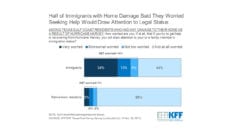The deportation of undocumented immigrants living in the US reached an all-time high during the Obama administration. In 2013, close to 439,000 unauthorized immigrants were deported, more than half for non-criminal violations such as traffic infractions. This earned President Obama the moniker, “deporter in chief,” by critics and immigrant rights activists who believed he reneged on his vow to focus on “felons not families.”
The election of Donald Trump in 2016 ushered in a new era of enhanced immigration enforcement, focusing on both border and interior removals. The policies enacted early on included a ban on migrants from seven Muslim countries and plans to build a fortified fence along the southern border. In April 2018, a zero-tolerance policy was implemented to deter migrants, including asylum seekers, from entering the US. These efforts both amped-up Obama era priorities and reversed decades-old asylum policies requiring migrants, refugees, and displaced persons to surrender themselves to border officials and declaring their intent to seek asylum before being released while awaiting a hearing.
As the nation continues to debate the Trump administration’s immigration policies, the human costs are lost in the discussion. While it is too early to know the long-term consequences of Trump’s zero-tolerance policy, findings from a study my co-author and I conducted shed some light on the effects of enhanced immigration enforcement, namely detention and deportation. Our findings can be extrapolated to understand consequences for migrants who have experienced family separation.
Drawing on existing research in sociology, social work, and criminology, we examined the collateral consequences or unintended ramifications of arrest or imprisonment on undocumented Latino immigrants living in Colorado from 2006 to 2013 when, SB 90, one of the country’s first “papers, please” laws was in effect. This law – similar to ones subsequently implemented in Arizona, Georgia, and Alabama – gave law enforcement the ability to stop persons suspected of being in the country without papers, resulting in thousands of arrests, detentions, and deportations.
In terms of socioemotional health, we found individuals who were detained experienced significant emotional distress stemming not only from their experiences while in detention but also from fear of being separated from their children as well as their inability to find employment upon release.
Through 76 interviews with undocumented immigrants and their immediate family members, including those living in mixed-status households where members have different legal statuses, we found 18 participants had direct or indirect experiences with detention and/or deportation. The collateral consequences centered on three outcomes: job prospects, socioemotional health, and social mobility.
In terms of socioemotional health, we found individuals who were detained experienced significant emotional distress stemming not only from their experiences while in detention but also from fear of being separated from their children as well as their inability to find employment upon release. Family members also experienced collateral consequences, often in the form of secondary or vicarious trauma. Children were especially affected by the detention or deportation of a parent. They expressed symptoms of anxiety, fear, and toxic stress, outcomes consistent with children whose parents have been incarcerated.
While our study was conducted prior to the zero-tolerance policy, the findings call attention to the negative economic, psychological, and social consequences of immigration enforcement, which are cumulative, long lasting, and extend beyond issues in the legal system.
Some have rightfully called the current state of immigration enforcement a humanitarian crisis, particularly as more migrants are apprehended at the border every day. Children are also being apprehended and placed in detention where some have died or become seriously ill. Our research shows that immigration enforcement is as much a public health crisis as it is a humanitarian one, the results of which may not be fully revealed for years to come.
Photo by Lubo Minar on Unsplash














